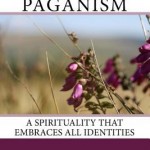That’s enough apple pie metaphors… let’s get down to brass tacks.
It’s good to have descriptions of what a word means, so that labels are mutually comprehensible. It’s also quite nice when the meaning of a word bears some vague resemblance to its etymology. But there’s a conflict between creating a meaning that is inclusive enough to include the majority of people who want to identify as that label, and making a word completely meaningless.
A definition is a fairly precise meaning or set of meanings that are generally agreed usage(s) of a word and what it denotes.
However, language usage is fluid and changeable, and different groups of people use words differently in different contexts. That’s why it is a good idea to examine the connotations of a word, so that we can describe how it is used in different contexts.
Examples of words that have highly fluid — and thus highly disputed — meanings: Pagan, polytheist, and Wiccan.
Part of the reason that these words are disputed is because the dictionary definitions are largely unhelpful and out of date.
Why are the meanings disputed?
If a group of people wants to describe its practice, beliefs, and values as distinct from those of another group, it becomes helpful to have a name that describes only that group, and is not in use by another group. This is why the various denominations of Christianity have created labels to distinguish themselves from each other. It’s why there are umpteen different varieties of witchcraft, Druidry, and Heathenry. You can recognise some common factor that makes them fit in their respective categories; but there’s enough difference between them that it is worth adding a qualifier to the label.
Wicca
The word “Wiccan” has a fairly chequered history. Gerald Gardner referred to all witches as “the Wica“. Charles Cardell described his group as “Wiccens“. Gradually, in the USA, Wicca came to refer to any Wiccan or “Wiccanish” tradition. In the UK, it tends to refer to Gardnerian and Alexandrian Wiccans — but many people identify as Wiccan who have never been initiated into those traditions. (Part of the reason for this is that it became very difficult to identify as a witch during the late 1980s and early 1990s, and Wiccan became a handy euphemisim for witch.) The word “Wicca” has become so broad and confusing that it may be impossible to restrict its meaning to Gardnerian and Alexandrian Wiccans.
There are also other witchcraft traditions (in the UK, Canada, Australia, and the USA) such as the 1734 tradition, the Clan of Tubal Cain, Feri, Reclaiming, and so on. Most of them are initiatory. Fortunately, hardly anyone disputes that the word “witch” applies to all these different traditions.
It is also worth noting that uniformity of belief is not the prime focus of witchcraft traditions. You can be a polytheist witch, a duotheist witch, a pantheist witch, an atheist witch, an animist witch, or some combination of these. (Some readers of All Acts of Love and Pleasure: inclusive Wicca were surprised that I said that you can be an atheist witch. It’s more difficult to be a materialist witch, not believing in or experiencing energies; but not believing in gods is not a barrier.)
Polytheism
To my mind, polytheism just means “many gods” or “belief in many gods”. It doesn’t say anything about how you worship them, or what type of rituals you perform to get in touch with them. Some people want to define polytheism as “religious regard for many gods” (in order to exclude those who acknowledge that gods exist but don’t have any truck with them – but I think that is redundant, as even if a Christian acknowledges that our gods exist in some way, they don’t acknowledge them as gods, so their view is irrelevant to the definition of the term).
If you want to describe a particular way that people interact with the gods, or a particular concept of what they are, then I would argue that you need a qualifying adjective. Various qualifying adjectives have been suggested (hard polytheism, soft polytheism, devotional polytheism, relational polytheism, Jungian or archetypalist polytheism, monistic polytheism, henotheistic polytheism, mystical polytheism), not in order to split polytheism as a whole, but to provide more accurate descriptions of how people relate to the gods.
Various people have different understandings of what polytheism means in their religious context. If someone else’s meaning of polytheism conflicts with your meaning, then you have two possible options:
- claim that their meaning / usage / understanding is wrong;
- add a qualifying adjective to distinguish your usage of the term from theirs.
Over recent years, there have been various online arguments about how to do polytheism “properly”, such as:
- Should you have a specific patron deity?
- Can you choose your patron deity, or should they choose you?
- Can you say no if you are chosen by a deity you don’t want? (Yes)
- Do we serve the gods, or are they allies?
- Can we ever know the true nature of the gods?
- What does “real” mean?
- Who has the authority to answer these questions for others?
What’s really going on?
It is probably not possible to “win” one of these arguments, or answer the question to everyone’s satisfaction. But there is always someone who wants their definition of a concept to be the only valid definition, and to be a gatekeeper of who gets to identify as a particular label. Being a gatekeeper or the person who gets to define a term is a position of power and control, potentially with authority attached to it.
Whoever gets to define or describe what polytheism is will have a huge influence on its future development. If it is a broad-brush movement with many different ways to be polytheist, it will become large, nebulous, and hard to control. If it is narrowly defined, it will be much smaller, but possibly easier to control. And it will end up excluding people whose insights, ideas, and practices might have been valuable to it.
My own position is that I don’t want to control anything. I am inherently distrustful of authority (including any authority that I myself may accidentally have acquired). Any authority should have checks and balances with it. If you are the high priestess of a coven, or the leader of a religious tradition, there should be a process for consultation and establishing consensus, and in large groups, for democracy and accountability. For example, in the Inclusive Wicca Discussion Group that I founded on Facebook, I created a set of group guidelines and invited members to vote on them and add to them; and there is more than one moderator for the group. In my coven, we take it in turns to write rituals, so everyone gets the kind of ritual they like; and whoever has written the ritual is the facilitator for that ritual. Whilst I am the most experienced witch in the coven, so the buck does tend to stop with me, I do try to empower others. The process of teaching and learning that we use is all about sharing ideas.
If you want to create a sub-tradition of polytheism that has a set of beliefs, practices, and values that meet your expectations and requirements, that’s fine. But don’t try to label it as the One True Way of polytheism. You will need to give it a more specific name. Some have argued that if polytheism is seen as a catch-all term that includes soft polytheists, archetypalists, and so on, then it becomes a less useful term. Maybe so, but that’s just how language and terminology work.
That’s why Niki Whiting proposed the term ‘relational polytheism’, and others have proposed other qualifying adjectives: to be clear about how our polytheism works out in practice and in context. Similarly, there are different flavours of Wicca and witchcraft, each with their own label, to enable people to find a flavour of Wicca that’s right for them.
People are confusing denotation with connotation, as often happens when the meaning of a term is contested. The term polytheism denotes ‘many gods’. To a devotional polytheist, that has connotations of devotion, religious regard, and so on. To a relational polytheist, the connotations are forming relationships with the gods. In order for different groups of people to find the polytheists they want to hang out with, we need those qualifying adjectives so that everyone who honours many gods can call themselves polytheists, without insisting on a particular definition of a god, but if you want to be more precise about how you want to honour the gods, or what you think gods are, then use a qualifying adjective.
The alternative is that a tiny group of people get to define what polytheism is and who gets to call themselves polytheist, till the whole thing turns into a clique and everyone else loses interest.
Polytheism isn’t yours
As Bekah Evie Bel points out, polytheism isn’t yours. And it’s not mine either. It belongs to everyone.

licensed for reuse under this Creative Commons Licence
















